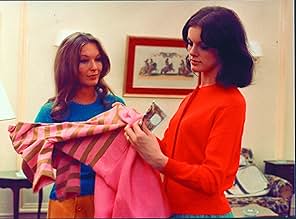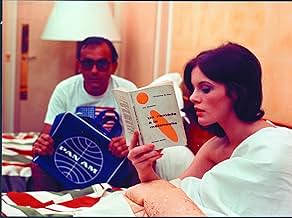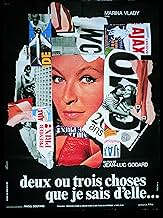Un día en la vida de una ama de casa y prostituta parisina, intercalado con reflexiones sobre la guerra de Vietnam y otros temas contemporáneos.Un día en la vida de una ama de casa y prostituta parisina, intercalado con reflexiones sobre la guerra de Vietnam y otros temas contemporáneos.Un día en la vida de una ama de casa y prostituta parisina, intercalado con reflexiones sobre la guerra de Vietnam y otros temas contemporáneos.
- Dirección
- Guionistas
- Elenco
- Premios
- 1 nominación en total
- Young Man
- (sin créditos)
- Girl Talking to Robert
- (sin créditos)
- Girl in Bath
- (sin créditos)
- Christophe Jeanson
- (sin créditos)
- Meter Reader
- (sin créditos)
- Marianne
- (sin créditos)
- Monsieur Gehrard
- (sin créditos)
- Girl
- (sin créditos)
- Man in Basement
- (sin créditos)
- Author
- (sin créditos)
- Pécuchet
- (sin créditos)
- John Bogus
- (sin créditos)
- Woman in Basement
- (sin créditos)
- Bouvard
- (sin créditos)
- Robert Jeanson
- (sin créditos)
- Roger
- (sin créditos)
- Dirección
- Guionistas
- Todo el elenco y el equipo
- Producción, taquilla y más en IMDbPro
Opiniones destacadas
There is little plot to the film, and instead Godard uses every film-making technique in his arsenal to take the audience on a journey through the Paris suburbs, having his characters delve into rambling monologues, often responding to questions or regurgitating lines fed through an ear-piece by Godard himself. The main focus is Juliette (Marina Vlady), who occasionally prostitutes herself so she can buy pretty clothes or perhaps just to relieve herself of the boredom of the consumerist lifestyle, while her husband Robert (Roger Monsoret) listens to speeches on the radio regarding America's involvement in Vietnam.
It's with his over-simplified characterisation of Juliette that 2 or 3 Things fails to hit the mark. She is beautiful and intelligent, but seems to only truly love shopping or catching the eye of a handsome man in a cafe. There's little of the free-spirited charisma that Karina embodied in her various roles under Godard, but perhaps that's the point. Themes are often explored with a remarkable lack of subtlety, with the director's obvious opposition to the illegal war in Vietnam cropping up many times throughout the film, with photographs of victims of the war spliced into a rather silly scene involving an 'American' photographer (with a heavy French accent) and his odd fetish with placing bags over ladies heads and having them act out a routine.
Far more impressive are the visuals, with the celebrated shot of a swirling espresso while Godard whispers about his own inadequacy being the most memorable image, and the sheer ambition of a project shot so quickly. Godard is both criticised and adorned for being simply too intellectual and obtuse for film, and 2 or 3 Things is one of the greatest examples of his unwillingness to craft a digestible film for his select audience. The dialogue is often wonderful and poetic, yet sometimes it's rambling nonsense, spoken by characters who have no place in the story, almost as if Godard got bored and moved his camera to a conversation he found more interesting. It's both frustrating and fascinating to see a director of such singular vision, and while there is little of the excitement and energy of his early New Wave work, 2 or 3 Things is an experience like no other.
Non-sequiturial loose-ends of non-communication between the characters, and conversations between the actors and the director which we are not allowed to follow.
Uncommunicative and unengaged philosophico-political maunderings of citizens who are floundering conceptually in a system that cannot sustain them, either morally or intellectually.
A view of Parisian building-sites as a social upheaval which yet represents the antithesis of any structural or constructivist manifestation of social progress.
A film that is, like the capitalist society that has the eye of the camera hypnotised, a profoundly blank and alienating surface, whose technique is only occasionally relieved by gratuitous scenes of meaning:
E.g. -
A woman trapped in a sink estate and yearning to be free, who is compelled by the desparation of her dream to entrap and enslave herself even further through prostitution;
The intrusion of a pimp-like meter-reader into the pure nakedness of private space;
A creche in a brothel;
A secular catechesis - The simple, non-sexual, non-manipulative dialectic of honest exploration that makes us human;
The still-birth of revolutionary thought as the spiral galaxy in a coffee-cup ...
All-in-all, the representation of a society which is profoundly inhospitable to the human beings who should constitute it, and which consequently does not permit the realisation of any aspect of humanity.
All we get are fugitive glimpses of life in the process of moral and intellectual decay. Thought and character remains unrealised, and the film is therefore also inchoate as the necessary reflection of this social unreality.
Here is a wan world, haemmoraging meaning as we watch. Here before us are the helpless ghosts of an industrial medium. They dance fitfully in the unchanging wind, the fantastic commercial simulacra in which we bind our free nature.
Strips of film, strung out like human fly-paper, where fluttering images stick only as they die. In place of creative pressure, an air of ennui, of carelessness: A drop-out film - a film of drop-outs, plot-holes in the threadbare social fabric, - neglectful of all appearances. The face of the film gazes basilisk-like out upon the viewer, resentful of our settled habits of non-involvement. Two frozen gazes cancel, the mutual incomprehension only verging on hostile irritation. No reaction. No drama. The light dies.
The hypnotic mirror of reproach whose conscience we yearn to assuage, that traps our humanity in the voyeur's dream, as it is projected back upon us in the Gorgon's gaze.
Desire is petrified - one's petty film-going expectations of this penetration of dark places disappointed. One escapes from the deathly spell of cinema into the real world.
Godard's lesson is that there is nothing meaningful in this cave of artificial shadows, and that he will bitterly wean us from our facile consumerist dreams, that we may the better engage with the harsh political realities of life.
The radically disillusioned auteur deconstructs himself. Le derniere vague flops exhausted on that endless strip where empty sprocket-holes run on aimlessly towards a dying sun.
The mechanism of dreams runs down.
We are not automata - we are made up by life. To live is the story we enact, without intermediary, and unmediated. The immediate and the authentic are alien to art. Art is a whispering empty shell left high and dry. Life is not the element of dead things: Do not listen to the shallow siren voice of le faux vague! Plunge back into humanity's proper medium.
Thus does a revolution in seeing strip out the gelatinous scales of our burned-out eyes, and there is no more interference with the wavelengths of light being broadcast from the nearest star.
Thus do the sighing bones of life articulate the bounds of existence.
We are the tides that wax and wane - the ocean that overwhelms itself, drowning its own waves in one flood of being.
Godard's film and films are under the influence of this larger movement. With his work, we are cast adrift from all anchors and familiar landmarks. We are 'all at sea'. There is a transition - a movement that is perhaps nearer to momentum than inertia - from whence we cannot recall to whither we cannot see. His is the ultimate cinema of flux.
And all of this, of course, with some of the most breathtaking cinematography I've seen in any of his work- there are close-ups that, as repetitious as they might've been, really did work. Like with the coffee- we see the coffee and the bubbles, and the colors swirling, while the narration keeps on going. There's even a very self-conscious moment where the camera blurs, the narration mentions blurred perspective, then when things come into 'focus' on both ends. In fact, this is not only one of the most self-conscious of all of Godard's work, but one of the most self-conscious films I might have ever seen. Not that this is an immediate negative, and in this framework Godard's intentions, aside from giving a good kick in the nuts to conventions and what the usual even means in typical words and descriptions of 'things' much less with cinema. There's almost a sense of consciousness expansion he's after in this self-consciousness too, which is par for the course for a Godard film. And it's also loaded to the gills with bright primary colors (this was continued into Week End, though with that in much greater, striking effect), and product placements galore; it always gives one a grin to see his great love/hate relationship with items from mass marketing and produce. And, of course, those title cards.
But what ends up lacking from the film for me, and why I would only consider it a good Godard film as opposed to a masterpiece, is that I get a lot more fulfillment watching Godard's work when he just loses all abandon of common plot-sense, and just makes almost an video essay with plenty of semantics, a loose story, and an eye for locations and people and scenery and products and all sorts of things that show him being instinctively good with the camera...BUT, that it's also entertaining. It's not that 2 or 3 Things I Know About Her isn't never quite interesting, but the fulfillment I got out of it was more of being so familiar with his work that I could get a kick out of things I could already expect in the changes of form and moments of contemplative narration, not really out of any emotional connection though to anything with anyone in the film. Juliette, unlike Karina's Nana (who, by the way, as a tongue-in-cheek in-joke appears in a pop-art style photo on a wall in one scene right from that movie), is at least 70% of the time not really a character in the usual sense: if anything she's more of a mouthpiece, a kind of figure for Godard to put forward his ideas of feminist/radical thinking, done in a manner of voice and inflection that is always the same, rarely shifting. Maybe that's part of the point, and by the end we may know more than two or three things- especially about what she's thinking and attitudes on gender and the whys and why nots of just living and existence- but emotions are almost null & void in this world.
In the meantime, as Godard maybe knows he doesn't have enough of a story with her 'real' character, when not talking to the camera, as a wife and mother, he shifts attention at times to random moments with other women, like one who talks to the camera about her banal existence ("I walk, climb, see a movie twice a month, etc"), or with a sort of touchy sexual discussion in a bar. The focus actually is never too grounded for Godard, which is partly what I mean about this film hinting at the descent his films would go to in the 80s and 90s (at least from my point of view). It's not JUST about women, it's almost about everything- drugs, culture, TV, politics, war (Vietnam especially, quite the topical philanthropic satirist he was), automobiles (a funny bit happens with a red car too), literature, morality, and all that and a bag of 60's-era Godard chips. It's worth checking out, I suppose, especially in widescreen, but not as something to see right away if getting into the director's work- I think if I had seen this as my third or fourth Godard film I might've disliked it even more. As apart of a stretch of films, I respect it and am involved, but compared to the others it's not as successful in terms of it really connecting more than it does. B+
¿Sabías que…?
- TriviaWhen Juliette drops off her daughter at the day care/brothel, there is a painting on the wall of a screen shot of Nana Kleinfrankenheim, portrayed by Anna Karina, in Vivir su vida (1962).
- Citas
Narrator: Since social relations are always ambiguous, since my thoughts divide as much as unite, and my words unite by what they express and isolate by what they omit, since a wide gulf separates my subjective certainty of myself from the objective truth others have of me, since I constantly end up guilty, even though I feel innocent, since every event changes my daily life, since I always fail to communicate, to understand, to love and be loved, and every failure deepens my solitude, since - since - since I cannot escape the objectivity crushing me nor the subjectivity expelling me, since I cannot rise to a state of being nor collapse into nothingness - I have to listen, more than ever I have to look around me at the world, my fellow creature, my brother.
- ConexionesEdited into Notes pour Debussy - Lettre ouverte à Jean-Luc Godard (1988)
Selecciones populares
- How long is 2 or 3 Things I Know About Her?Con tecnología de Alexa
Detalles
Taquilla
- Total en EE. UU. y Canadá
- USD 104,038
- Fin de semana de estreno en EE. UU. y Canadá
- USD 11,214
- 19 nov 2006
- Total a nivel mundial
- USD 104,038
- Tiempo de ejecución1 hora 27 minutos
- Mezcla de sonido
- Relación de aspecto
- 2.35 : 1
Contribuir a esta página




























